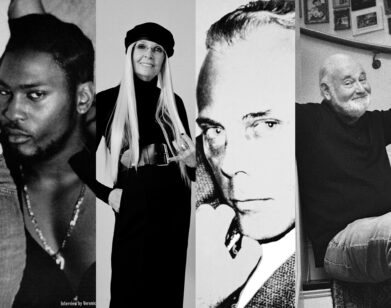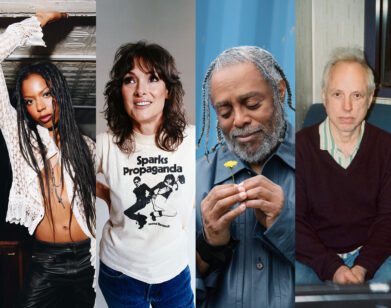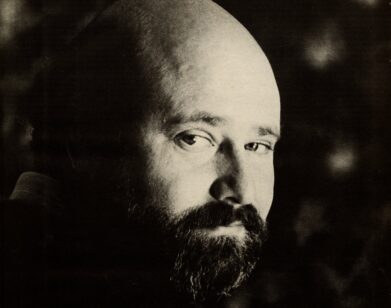He Oughta Be in Pictures

When we asked Lil Wayne who he’d like to see play him in a movie about his life, we should have known what he’d say: “Me.” (Wayne doesn’t need anybody but Wayne.) We’ve gotten caught up in dreaming about what that might look like, and feel compelled to share: here are three possible filmic permutations of the Lil Wayne story.
The Bigger-Than-Life Biopic
Director: Oliver Stone, of course.
Focus: Since Stone isn’t averse to exaggerating details for dramatic effect, we think he’d be best put to work adapting the already-somewhat-unbelievable first 17 years of Wayne’s life. Though Wayne signed to the Williams Brothers’ Cash Money Records at age 9, the Oliver Stone version would probably push it to age 6—we’re envisioning a poignant scene where Wayne spits his first rhymes while learning to ride a bike. As for the next act of the movie, well: Wayne told Playboy he lost his virginity when he was 11, and we’re sure Stone would run with that, as well as with the fact that Wayne accidentally shot himself close to the heart when he was 13.
Next up: his time with the Hot Boys, which he joined at 15. Teen angst plus little supervision plus three other young members of the group (B.G., Turk, and Juvenile) equals, we think, temper flare-ups and a hell of a climax. We end in 1999, when, in July, Hot Boys releases the platinum-selling Guerrilla Warfare—and four months later, in November, Wayne releases his own platinum solo debut, Tha Block is Hot. Wayne’s on top of the world, with lead single “Tha Block is Hot” at #24 on the Billboard R&B chart. Then the second single, “Respect Us,” comes out—and doesn’t hit the charts. Yet somehow, Wayne’s not worried. The film ends ambiguously: can the teen rap sensation with all the potential actually make good as a grown-up?
Supporting Cast: Taraji P. Henson (The Curious Case of Benjamin Button) as Lil Wayne’s mom, Cita Carter; Rob Brown (Treme) as his mentor, Bryan “Baby” Williams; a special spot by Viola Davis as the teacher who directed Wayne in his seventh-grade production of The Wiz—and who saw something special in him.
Memorable Line: “He’s just a little kid!” Bryan “Baby” Williams tells his brother incredulously, after his first meeting with Wayne. “He may be little… but he’s gonna be huge.”
Click here to see The Stoner Comedy
The Stoner Comedy
Director: David Gordon Green
Focus: It’s a light summer movie that loosely follows the plot of Wayne’s life from 2000 to 2007, with plenty of lengthy, atmospheric scenes of Wayne and his pals and collaborators (Williams, Juvenile, DJ Khaled, various hangers-on) smoking weed and goofing around. If there needs to be a “plot,” it could be that Wayne writes amazing lyrics when he’s just high enough and having just enough sex, but he continues experimenting to find the perfect balance. When writing Lights Out (2000), which only goes gold, he isn’t high enough—but when writing 500 Degreez (2002), he’s too high!
Somewhere in here, it’s essential to include the infamous five-person orgies, which we’re sure David Gordon Green would handle with grace and dignity.) By Tha Carter (2004) and Tha Carter II (2005), he’s just about got it down, and the constant tinkering eventually makes him superhuman. Others beg for his formula, but he won’t budge—and he loses friends over it, but that hardly matters. In 2007, he’s got the endo/intercourse proportion down to such a science that he works on almost 80 songs and is named The New Yorker‘s rapper of the year. We close with him reading the article, smiling, and rolling a joint.
Supporting Cast: This is recent enough history that the major names involved could, like Wayne, play themselves. We demand cameos by Kanye, Beyonce, Jay-Z, and T-Pain, at the very least.
Memorable Line: When Wayne tells his entourage in 2005, that he’s going to be working on “Shooter,” a song featuring UK R&B sensation Robin Thicke, there’s a long pause. Then someone finally exhales a mouthful of smoke and asks what we’ve all wondered at one point or another: “Who the fuck is Robin Thicke?”
Click here to see The Sentimental Tearjerker
The Sentimental Tearjerker
Director: Frank Capra (Wayne could find him). Or John Lee Hancock (The Rookie, The Blind Side).
Focus: We open on Lil Wayne standing in front of a wall calendar, about to turn the page. It’s March 1, 2010. On the calendar, we see a big red star marking February 2—the day his first rock album, Rebirth, dropped—to universally negative reviews. Mentally, Wayne flips through the scores he knows so well: one star from the Los Angeles Times, a 4.5 from Pitchfork, two-and-a-half stars from Rolling Stone, a D+ from Entertainment Weekly. He shakes his head and flips the calendar to the next page; there’s a big black X on March 2. Tomorrow, he thinks, he’ll go to Rikers to serve a yearlong prison sentence for a 2007 weapons-possession charge. He buries his head in his hands—this is the lowest he’s felt in a long, long time.
Cut to Wayne in prison a week later, where fellow prisoners tell him they’re fans; he thanks them, quietly, and tries not to make a scene. He reads the Bible, eats a sandwich; days go by. When he finally falls asleep after one particularly tough night, an angel comes to him in a dream and tells him to treat these long, open days as a gift: to focus on his craft, and to repay the kindness that his mentor, Bryan “Baby” Williams, showed him by helping to nurture the careers of other young musicians.
Montage time! Wayne regains his focus; he works out, writes rhymes, writes letters to his kids and to his own protegés, Drake, Nicki Minaj, and Lil Twist, and finds special solace in writing back to the fans who flood Rikers with letters to him. He gets visits from the producers who are working on his eighth album, I Am Not a Human Being; he listens to cuts, makes suggestions (and hits a snafu when he’s caught with an mp3 player in prison). Time soldiers on, and Weezy has a new sense of purpose—and when I Am Not a Human Being drops in late September to positive reviews, he’s hardly surprised. He’s released a month later on good behavior. As he walks out of Rikers, he sees a crowd of his friends and loved ones has gathered outside to welcome him back to normal life. In the middle are Drake and Nicki, the first ones to hug him: the future.
Supporting Cast: Isiah Whitlock Jr. (The Wire) as the angel who visits Wayne; Shareeka Epps (Half Nelson) as Nicki Minaj in flashback; Aubrey Graham (Degrassi) as Drake.
Memorable Line: As long as we’re paying a little homage to It’s a Wonderful Life, we think it might be nice if Wayne’s angel repeated one of the lines from that film verbatim—it certainly applies: “Strange, isn’t it? Each man’s life touches so many other lives. When he isn’t around he leaves an awful hole, doesn’t he?”






